Global Smart Construction Market, By Offering, By Technology, By Application, By End User, By Region & Segmental Insights Trends and Forecast, 2024 – 2034
- Industry: Construction & Manufacturing
- Report ID: TNR-110-1289
- Number of Pages: 420
- Table/Charts : Yes
- September, 2024
- Base Year : 2024
- No. of Companies : 10+
- No. of Countries : 29
- Views : 10070
- Covid Impact Covered: Yes
- War Impact Covered: Yes
- Formats : PDF, Excel, PPT
Smart construction is the integration of advanced technologies like IoT, AI, BIM, and robotics into the construction industry to enhance efficiency, safety, and sustainability. Globally, the smart construction market is rapidly expanding, driven by the demand for innovative solutions that streamline project management and reduce costs.
In day-to-day life, smart construction has become vital for improving the quality and speed of building projects. It enables real-time monitoring, predictive maintenance, and energy-efficient designs, ensuring that infrastructure meets modern standards. The market’s growth reflects a broader shift towards smarter, more sustainable urban development, where technology plays a central role in transforming how buildings are designed, constructed, and managed.
The Global Smart Construction Market Generated Revenue of US$ 1.37 Billion in 2023 and US$ 5.55 Billion in 2034 and is Expected to Grow at a CAGR of 13.6% from 2024 to 2034.
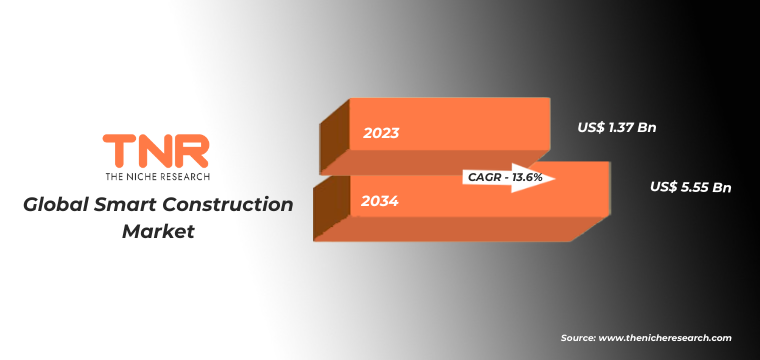
Advanced Tools and Upcoming Trends in Construction Technology:
Advanced tools in construction technology, such as drones, AI-driven software, and 3D printing, are revolutionizing the industry by enhancing precision, reducing labor costs, and improving safety. Drones provide aerial site surveys, while AI optimizes project management and resource allocation.
3D printing enables rapid prototyping and on-site construction of complex structures. Upcoming trends include the rise of autonomous construction vehicles, the integration of augmented reality for on-site visualization, and the growing use of sustainable materials, all aimed at increasing efficiency and environmental responsibility in construction projects.

Smart Construction Market Dynamic:
Growth Drivers-
- Technological Advancements: The integration of IoT, AI, and BIM in construction is a major growth driver for the smart construction market. These technologies enable real-time data analysis, predictive maintenance, and improved project management, significantly enhancing efficiency, reducing costs, and minimizing risks in construction projects.
- Increasing Focus on Sustainability: The growing emphasis on green building practices and energy-efficient designs is driving demand for smart construction solutions. Sustainable construction methods, supported by advanced technologies, reduce environmental impact, optimize resource use, and ensure compliance with evolving regulations, fueling market growth globally.
- Rising Urbanization: Rapid urbanization and infrastructure development, particularly in emerging economies, are boosting the adoption of smart construction technologies. As cities expand, the need for efficient, scalable, and cost-effective construction solutions becomes crucial, driving the market’s expansion and the adoption of innovative construction tools.
Challenges-
- High Initial Costs: The adoption of smart construction technologies often requires significant upfront investment in advanced tools, software, and training. These high initial costs can be a barrier for small and medium-sized construction firms, limiting widespread adoption and slowing the market’s overall growth.
- Skilled Labor Shortage: Implementing smart construction technologies requires a workforce skilled in operating advanced tools like BIM, AI, and robotics. However, the industry faces a shortage of such expertise, creating a challenge in effectively integrating these technologies and realizing their full potential in construction projects.
- Data Security Concerns: The increased use of IoT and connected devices in smart construction introduces vulnerabilities related to data breaches and cyberattacks. Ensuring the security of sensitive project data and maintaining privacy are significant challenges that can hinder the adoption of smart construction technologies in the global market.
Global Smart Construction Market Segmentation by Offerings, Technology, Application, End User, Region
Software/solutions segment is set to dominate the smart construction market, commanding a substantial revenue share of 36.8% over the forecast period. Software companies are increasingly investing in smart construction technologies, recognizing the growing demand for advanced project management and analytics tools. These investments are driving innovation, with manufacturers launching new, sophisticated solutions that enhance efficiency, safety, and collaboration in construction projects. Innovations like AI-powered design software, real-time data monitoring platforms, and cloud-based project management systems are transforming the industry, making software/solutions a critical component in the advancement of smart construction practices globally. For instance, in June 2022, View introduced its cloud-native smart building platform. This platform offers real estate technology through software components designed to manage, connect, and enhance a portfolio of smart buildings, featuring robust cybersecurity defenses and exceptional flexibility.
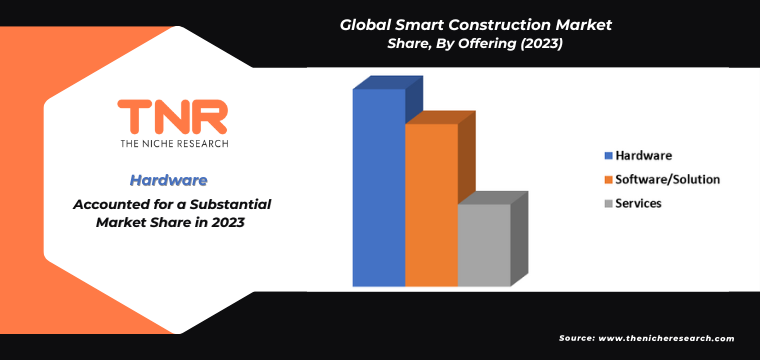
Internet of things (IoT) technology dominated the global smart construction market, acquiring a revenue share of 26.4% due to IoT’s ability to revolutionize construction processes through real-time data collection and analysis. IoT devices, such as sensors and connected equipment, provide valuable insights into project performance, equipment status, and environmental conditions, enhancing decision-making and operational efficiency. The technology also enables seamless integration of various systems, facilitating better management of resources, safety, and maintenance. As construction projects become increasingly complex, IoT’s role in optimizing performance and reducing costs continues to grow, solidifying its leading position in the market.
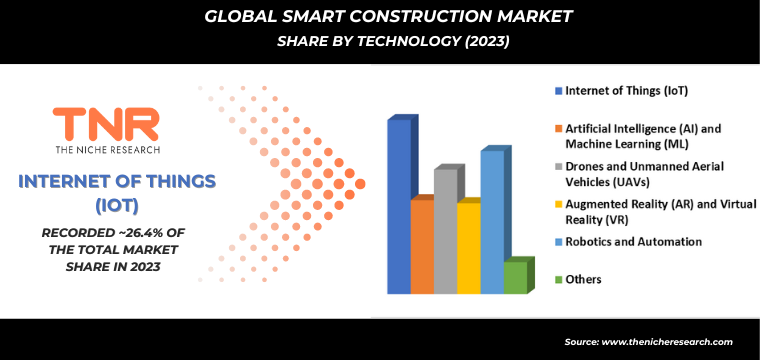
Sustainability and green building segment is anticipated to be the fastest-growing application in the smart construction market, capturing a substantial revenue share of 12.2% over the forecast period. As environmental concerns and regulatory pressures intensify, incorporating sustainable practices and green building principles has become crucial in the construction industry. This segment focuses on reducing energy consumption, minimizing waste, and using eco-friendly materials, aligning with global efforts to combat climate change and promote environmental stewardship. The emphasis on sustainability not only helps in meeting stringent regulations but also enhances the long-term value and efficiency of buildings, making it a key driver of innovation and growth in the smart construction market.
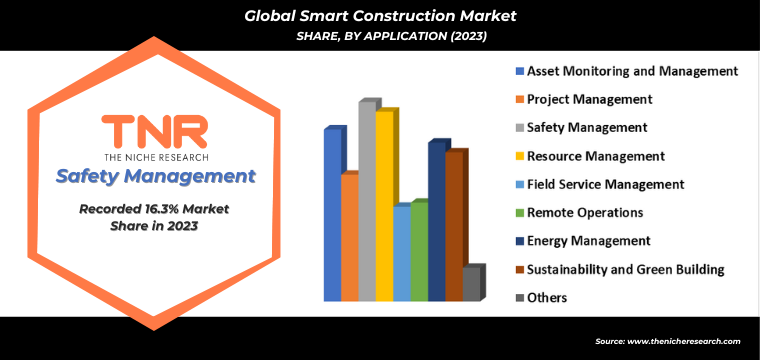
Infrastructure construction increasingly adopts smart construction techniques due to the need for enhanced efficiency, durability, and safety. This sector requires complex projects such as roads, bridges, and utilities that benefit significantly from advanced technologies like IoT, AI, and robotics. Smart construction methods enable real-time monitoring, predictive maintenance, and precise resource management, which are crucial for managing large-scale infrastructure projects. By integrating these technologies, infrastructure projects can achieve better performance, reduced costs, and extended lifespans. This approach not only meets the growing demand for resilient and sustainable infrastructure but also ensures that projects are completed on time and within budget. Henceforth, infrastructure segment dominated the market in 2023 with a CAGR of 11.1%.
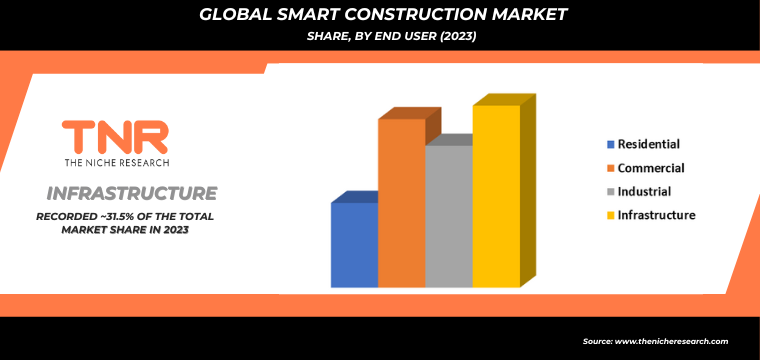
In 2023, Middle East & Africa is anticipated to play a significant role in propelling the growth of the smart construction market, contributing approximately 5.6% to its overall expansion. This contribution is fueled by rapid urbanization, increasing infrastructure development, and a rising focus on sustainability and smart technologies in the region. The Middle East, with its ambitious construction projects and investments in smart cities, and Africa, with its expanding infrastructure needs, both drive demand for advanced construction solutions. The adoption of smart construction technologies in this region is crucial for enhancing project efficiency, safety, and sustainability, thus supporting significant market growth.
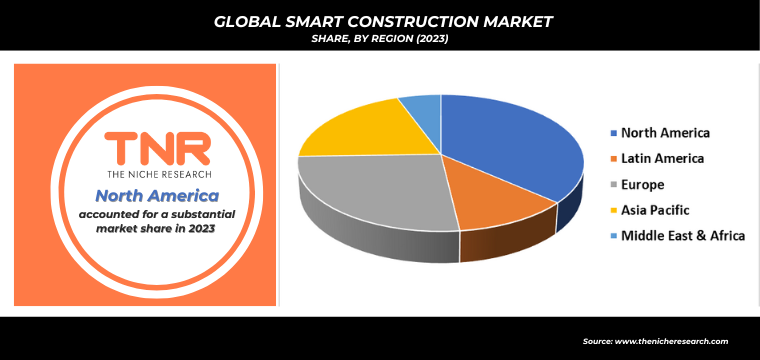
Major Players in Smart Construction Market
- Autonomous Solutions, Inc.
- Built Robotics Inc.
- Caterpillar Inc.
- Doosan Infracore Co., Ltd.
- Hitachi Ltd.
- Honeywell International Inc.
- Hyundai Construction Equipment Co., Ltd.
- IBM
- JDM Technology Group
- Komatsu Ltd.
- Oracle Corporation
- SAP SE
- Schneider Electric SE
- Sky Tronic Ltd.
- Volvo Construction Equipment
- Xuzhou Construction Machinery Group Co., Ltd.
- Zoomlion Heavy Industry Science and Technology Co., Ltd.
- Other Industry Participants
Global Smart Construction Market Scope:
| Report Specifications | Details |
| Market Revenue in 2023 | US$ 1.37 Bn |
| Market Size Forecast by 2034 | US$ 5.55 Bn |
| Growth Rate (CAGR) | 13.6% |
| Historic Data | 2016 – 2022 |
| Base Year for Estimation | 2023 |
| Forecast Period | 2024 – 2034 |
| Report Inclusions | Market Size & Estimates, Market Dynamics, Competitive Scenario, Trends, Growth Factors, Market Determinants, Key Investment Segmentation, Product/Service/Solutions Benchmarking |
| Segments Covered | By Offering, By Technology, By Application, By End User, By Region |
| Regions Covered | North America, Europe, Asia Pacific, Middle East & Africa, Latin America |
| Countries Covered | U.S., Canada, Mexico, Rest of North America, France, The UK, Spain, Germany, Italy, Nordic Countries (Denmark, Finland, Iceland, Sweden, Norway), Benelux Union (Belgium, The Netherlands, Luxembourg), Rest of Europe, China, Japan, India, New Zealand, Australia, South Korea, Southeast Asia (Indonesia, Thailand, Malaysia, Singapore, Rest of Southeast Asia), Rest of Asia Pacific, Saudi Arabia, UAE, Egypt, Kuwait, South Africa, Rest of Middle East & Africa, Brazil, Argentina, Rest of Latin America |
| Key Players | Autonomous Solutions, Inc., Built Robotics Inc., Caterpillar Inc. , Doosan Infracore Co., Ltd. , Hitachi Ltd., Honeywell International Inc., Hyundai Construction Equipment Co., Ltd. , IBMJDM Technology Group, Komatsu Ltd. , Oracle Corporation, SAP SE, Schneider Electric SE, Sky Tronic Ltd., Volvo Construction Equipment , Xuzhou Construction Machinery Group Co., Ltd. , Zoomlion Heavy Industry Science and Technology Co., Ltd. |
| Customization Scope | Customization allows for the inclusion/modification of content pertaining to geographical regions, countries, and specific market segments. |
| Pricing & Procurement Options | Explore purchase options tailored to your specific research requirements |
| Contact Details | Consult With Our Expert
Japan (Toll-Free): +81 663-386-8111 South Korea (Toll-Free): +82-808- 703-126 Saudi Arabia (Toll-Free): +966 800-850-1643 United Kingdom: +44 753-710-5080 United States: +1 302-232-5106 E-mail: askanexpert@thenicheresearch.com
|
Global Smart Construction Market
By Offering
- Hardware
- Software/Solution
- Services
- Consulting and Advisory
- Integration and Deployment
- Support and Maintenance
- Others
By Technology
- Internet of Things (IoT)
- Artificial Intelligence (AI) and Machine Learning (ML)
- Drones and Unmanned Aerial Vehicles (UAVs)
- Augmented Reality (AR) and Virtual Reality (VR)
- Robotics and Automation
- Others
By Application
- Asset Monitoring and Management
- Project Management
- Safety Management
- Resource Management
- Field Service Management
- Remote Operations
- Energy Management
- Sustainability and Green Building
- Others
By End User
- Residential
- Commercial
- Industrial
- Infrastructure
- Smart Roads
- Smart Bridges
- Smart Railways
- Smart Ports
- Smart Airports
- Others
By Region
- North America (U.S., Canada, Mexico, Rest of North America)
- Europe (France, The UK, Spain, Germany, Italy, Nordic Countries (Denmark, Finland, Iceland, Sweden, Norway), Benelux Union (Belgium, The Netherlands, Luxembourg), Rest of Europe)
- Asia Pacific (China, Japan, India, New Zealand, Australia, South Korea, Southeast Asia (Indonesia, Thailand, Malaysia, Singapore, Rest of Southeast Asia), Rest of Asia Pacific)
- Middle East & Africa (Saudi Arabia, UAE, Egypt, Kuwait, South Africa, Rest of Middle East & Africa)
- Latin America (Brazil, Argentina, Rest of Latin America)
Report Layout:
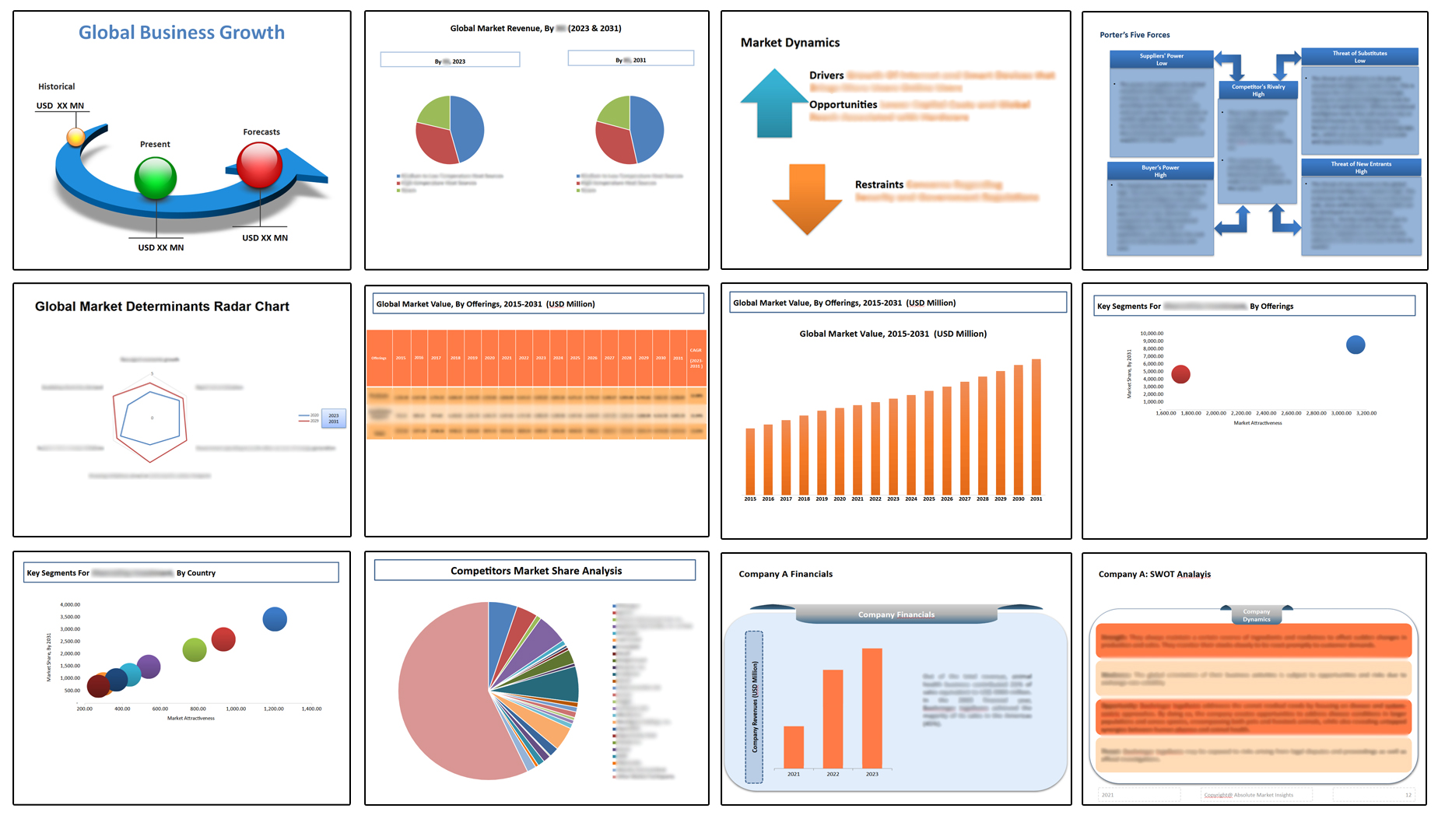
Table of Contents
Note: This ToC is tentative and can be changed according to the research study conducted during the course of report completion.
**Exclusive for Multi-User and Enterprise User.
Global Smart Construction Market
By Offering
- Hardware
- Software/Solution
- Services
- Consulting and Advisory
- Integration and Deployment
- Support and Maintenance
- Others
By Technology
- Internet of Things (IoT)
- Artificial Intelligence (AI) and Machine Learning (ML)
- Drones and Unmanned Aerial Vehicles (UAVs)
- Augmented Reality (AR) and Virtual Reality (VR)
- Robotics and Automation
- Others
By Application
- Asset Monitoring and Management
- Project Management
- Safety Management
- Resource Management
- Field Service Management
- Remote Operations
- Energy Management
- Sustainability and Green Building
- Others
By End User
- Residential
- Commercial
- Industrial
- Infrastructure
- Smart Roads
- Smart Bridges
- Smart Railways
- Smart Ports
- Smart Airports
- Others
By Region
- North America (U.S., Canada, Mexico, Rest of North America)
- Europe (France, The UK, Spain, Germany, Italy, Nordic Countries (Denmark, Finland, Iceland, Sweden, Norway), Benelux Union (Belgium, The Netherlands, Luxembourg), Rest of Europe)
- Asia Pacific (China, Japan, India, New Zealand, Australia, South Korea, Southeast Asia (Indonesia, Thailand, Malaysia, Singapore, Rest of Southeast Asia), Rest of Asia Pacific)
- Middle East & Africa (Saudi Arabia, UAE, Egypt, Kuwait, South Africa, Rest of Middle East & Africa)
- Latin America (Brazil, Argentina, Rest of Latin America)
The Niche Research approach encompasses both primary and secondary research methods to provide comprehensive insights. While primary research is the cornerstone of our studies, we also incorporate secondary research sources such as company annual reports, premium industry databases, press releases, industry journals, and white papers.
Within our primary research, we actively engage with various industry stakeholders, conducting paid interviews and surveys. Our meticulous analysis extends to every market participant in major countries, allowing us to thoroughly examine their portfolios, calculate market shares, and segment revenues.
Our data collection primarily focuses on individual countries within our research scope, enabling us to estimate regional market sizes. Typically, we employ a bottom-up approach, meticulously tracking trends in different countries. We analyze growth drivers, constraints, technological innovations, and opportunities for each country, ultimately arriving at regional figures.Our process begins by examining the growth prospects of each country. Building upon these insights, we project growth and trends for the entire region. Finally, we utilize our proprietary model to refine estimations and forecasts.
Our data validation standards are integral to ensuring the reliability and accuracy of our research findings. Here’s a breakdown of our data validation processes and the stakeholders we engage with during our primary research:
- Supply Side Analysis: We initiate a supply side analysis by directly contacting market participants, through telephonic interviews and questionnaires containing both open-ended and close-ended questions. We gather information on their portfolios, segment revenues, developments, and growth strategies.
- Demand Side Analysis: To gain insights into adoption trends and consumer preferences, we reach out to target customers and users (non-vendors). This information forms a vital part of the qualitative analysis section of our reports, covering market dynamics, adoption trends, consumer behavior, spending patterns, and other related aspects.
- Consultant Insights: We tap into the expertise of our partner consultants from around the world to obtain their unique viewpoints and perspectives. Their insights contribute to a well-rounded understanding of the markets under investigation.
- In-House Validation: To ensure data accuracy and reliability, we conduct cross-validation of data points and information through our in-house team of consultants and utilize advanced data modeling tools for thorough verification.
The forecasts we provide are based on a comprehensive assessment of various factors, including:
- Market Trends and Past Performance (Last Five Years): We accurately analyze market trends and performance data from preceding five years to identify historical patterns and understand the market’s evolution.
- Historical Performance and Growth of Market Participants: We assess the historical performance and growth trajectories of key market participants. This analysis provides insights into the competitive landscape and individual company strategies.
- Market Determinants Impact Analysis (Next Eight Years): We conduct a rigorous analysis of the factors that are projected to influence the market over the next eight years. This includes assessing both internal and external determinants that can shape market dynamics.
- Drivers and Challenges for the Forecast Period:Identify the factors expected to drive market growth during the forecast period, as well as the challenges that the industry may face. This analysis aids in deriving an accurate growth rate projection.
- New Acquisitions, Collaborations, or Partnerships: We keep a close watch on any new acquisitions, collaborations, or partnerships within the industry. These developments can have a significant impact on market dynamics and competitiveness.
- Macro and Micro Factors Analysis:A thorough examination of both macro-level factors (e.g., economic trends, regulatory changes) and micro-level factors (e.g., technological advancements, consumer preferences) that may influence the market during the forecast period.
- End-User Sentiment Analysis: To understand the market from the end-user perspective, we conduct sentiment analysis. This involves assessing the sentiment, preferences, and feedback of the end-users, which can provide valuable insights into market trends.
- Perspective of Primary Participants: Insights gathered directly from primary research participants play a crucial role in shaping our forecasts. Their perspectives and experiences provide valuable qualitative data.
- Year-on-Year Growth Trend: We utilize a year-on-year growth trend based on historical market growth and expected future trends. This helps in formulating our growth projections, aligning them with the market’s historical performance.
Research process adopted by TNR involves multiple stages, including data collection, validation, quality checks, and presentation. It’s crucial that the data and information we provide add value to your existing market understanding and expertise. We have also established partnerships with business consulting, research, and survey organizations across regions and globally to collaborate on regional analysis and data validation, ensuring the highest level of accuracy and reliability in our reports.















